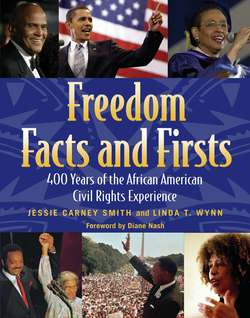Читать книгу Freedom Facts and Firsts - Jessie Carney Smith - Страница 110
На сайте Литреса книга снята с продажи.
Voter Registration Projects
ОглавлениеDuring the era of segregation, African Americans were denied voting rights by law in several southern states, and hindered from the free exercise of their Constitutional rights in other locations. Poll taxes, unfair literacy tests, “grandfather clauses” (prohibiting blacks from voting unless they could prove an ancestor of theirs could legally vote before 1857), and violence were used to prevent and discourage blacks from voting, especially in areas where they were a majority or large percentage of the population. Civil rights organizations began direct action and legal initiatives to challenge the existing order and secure voting rights. The NAACP launched several voter registration projects through branch affiliates beginning in the late 1950s.
Success was achieved in the Mississippi Gulf Coast region in 1960 and 1961 with leadership from Biloxi NAACP branch President Dr. Gilbert R. Mason, but efforts in other areas still met stern and sometimes violent opposition. Shortly after the creation of the Student Non-Violent Coordinating Committee (SNCC) in 1960, activist Robert “Bob” Moses was encouraged by mentor Ella Baker to travel to Mississippi, where he met local NAACP leader Amzie Moore. Moses was asked by Moore to increase the number of civil rights workers in the area, and to focus efforts on getting more black Mississippians to register and vote. The next year considerable numbers of black and white student activists came to McComb, Mississippi, to help with voter registration and basic literacy in black communities. Despite assaults, arrests, jailings, and murders of activists such as Herbert Lee (1961), and Medgar Evers (1963), voter education and registration efforts continued in the state.
In the fall of 1963, the Council of Federated Organizations (COFO) developed the Freedom Vote program to demonstrate black voting potential, and Moses expanded this concept into the “Freedom Summer” campaign of 1964. Despite the tragic murders of volunteers Michael Schwerner, Andrew Goodman, and James Chaney in June, Freedom Summer continued. Organizers established “freedom schools” and other community centers to address the educational, health, and legal needs of poor blacks; and they created the Mississippi Freedom Democratic Party, which challenged the legitimacy of the all-white Mississippi delegation to the 1964 Democratic National Convention in Atlantic City, New Jersey, led by activist Fannie Lou Hamer. These efforts dramatized the disenfranchisement of African American voters, and influenced the passage of the Voting Rights Act of 1965. As a result, numerous black candidates were elected to municipal, county, state, and national offices in southern states and other regions of the country. Mississippi changed from five percent of eligible blacks registered to vote in the 1950s to 66.5 percent by 1969.
Despite the increased number of black elected officials, their success did not immediately translate into meaningful socioeconomic improvements for their constituents. Jesse Jackson inspired increased voter registration efforts during his presidential campaigns of 1984 and 1988, and Congress passed the National Voter Registration Act in 1993. A number of African American media personalities also used their celebrity status to encourage increased African American voter registration and participation in recent years.
Fletcher F. Moon
Poll taxes, unfair literacy tests, “grandfather clauses” …, and violence were used to prevent and discourage blacks from voting.
